2023 Mitsubishi Outlander PHEV: The Gateway into Electrification
- Cory Fourniquet

- Jun 20, 2023
- 4 min read
We have tested plenty of EVs here at GT, but the powertrain option that currently makes the most sense for our family is the plug-in hybrid or PHEV. PHEVs take the best of both gas and electric powertrains into one system that works well in almost all situations. Enter the 2023 Mitsubishi Outlander PHEV.

Using a 2.4L MIVEC 4-cylinder gas engine in conjunction with a 20 kWh Lithium-ion battery and dual electric motors, the Outlander PHEV is the brand’s gateway into electrification. Standing as what could be many owners’ first electrified vehicle with a plug, the Outlander PHEV has over 30 miles of electric-only range, which would work well for the workweek commute, and uses the 4-cylinder gas engine for longer trips. In total, the Outlander PHEV has 420 miles of EPA-estimated range on a full charge and full tank of gas. Driver-selectable drive modes allow for holding an electric charge, great for when you are on long stretches of highway on your way into stop-and-go traffic, an EV mode which uses electric-only power as much as possible, and a traditional hybrid mode which uses a mix of both powertrains to optimize fuel efficiency. There is even a charge mode that uses the gasoline engine to recharge the battery, negating the need to plug the Outlander in at all.
The Outlander PHEV also has a trick up its sleeve that many PHEVs don’t: DC fast charging. Using its CHAdeMO plug, the Outlander PHEV can charge to 80% in just about 38 minutes, allowing for an increase in range while grabbing a bite to eat on a long road trip.
That is not the whole story with the Outlander PHEV, this is also a capable vehicle, earning the Northwest Outdoor Activity Vehicle of the Year at the 2023 NWAPA Mudfest. We took some time at the 2023 MAMA Spring Rally to adventure off the pavement in our tester and were pleasantly rewarded with a comfortable ride while traversing the trails. Did I mention that I was getting a back massage while driving?
The interior of the Outlander PHEV is what surprised me the most. Our SEL had quilted leather seats that were heated and featured a massage function on both front seats. The quilted design and contrast of the caramel-colored stitching and accents with the black semi-aniline leather was a nice visual touch as well. Seating was ample as this PHEV has three rows of seating, with fold-flat rear seats in the way back. Unfortunately, the rear seat will be best served for small children as I was able to get back there, but my head and legs did not have much place to go. That third row is really more of a bonus seat than it is likely to be used regularly.
Second-row seats had our family-favorite manually operated retractable sunshades, however, the entry method into that third row is not compatible with having a child safety seat installed. To climb into the way back, the second-row bench seatback leans forward, and the whole seat slides forward. We prefer the 3-row vehicles that have tilt-forward second-row seats that allow access to the extra seats even if a child seat is currently installed.
Inside, the connection with partner brand Nissan is apparent. The development of the Outlander was done in conjunction with Nissan and their Rogue SUV to cut costs for both brands in the development of a vehicle in the most hotly-contested category in the business. While Mitsubishi designers and engineers were given lots of freedom in creating the Outlander, the parts-sharing is most apparent inside. The 12.3-inch instrument cluster is almost an exact copy of what you find in the Rogue. The electronic drive selector is also a Rogue part, along with many other touch-points inside the Outlander. This is not a bad thing, it is just a sign of where both Mitsubishi and Nissan are in the market right now, being resourceful as they work their way back into the mainstream conversation.
The powertrain is completely Mitsubishi, however, no Nissan parts sharing here.
We only had about half an hour with the Outlander, which is not enough to truly get into what it would be like to own and live with in our regular lives (no, my commute does not involve ruts, tree roots, and that much dirt). I do hope to get one back on our home turf for a week of real-life testing to see what it is like to install Tucker’s car seat, load up for a road trip or a grocery run, and truly experience the plug-in powertrain in its happy place: stop-and-go traffic.
2023 Mitsubishi Outlander PHEV Specs:
2.4L MIVEC DOH 4-cylinder Engine
20/0 kWh Lithium-ion Battery
Dual Electric Motors
248 Horsepower
332 lb-ft of Torque
Rear Single Speed, Fixed Reduction Gear Box
All-Wheel Drive
Super All-Wheel Control
Drive Mode Selector:
Normal, Power, Eco, Tarmac, Gravel, Snow, Mud
Regenerative Braking System
Seating for 7
Heated, Massaging Front Seats with 2-person Memory
3-person Reclining Second Row
Retractable Rear Sunshades
Semi-Aniline Leather Seating Surfaces
Leatherette-Wrapped Door Panels and Dash Accents
20-inch Alloy Wheels
255/45 R20 Nexen Tires
9-inch Infotainment Screen with Wireless Apple CarPlay® & Android Auto™
12.3-inch Digital Instrument Cluster
10.8-inch Head-Up Display
9-speaker Bose Premium Sound System
3-Zone Automatic Climate Control
Hill Start Assist
Automatic High Beams
Forward Collision Mitigation with Pedestrian Detection
Traffic Sign Recognition
Blind Spot Warning with Lane Change Assist
Rear Cross-traffic Alert
Rear Automatic Emergency Braking
Lane Departure Warning
Side Curtain Airbags
Driver and Passenger Knee Airbags
Rear Seat Alert
Proximity Key with Push Button Start
EPA Fuel Economy
26 MPG Combined (Gas-only)
64 MPGe Combined
38 Miles of all-electric Range
Starting MSRP $39,845 (PHEV)
Price as tested: $50,880





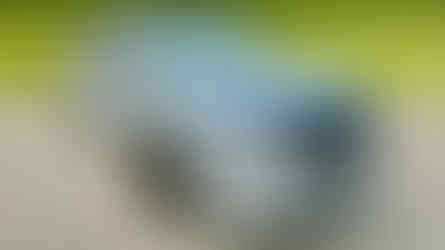










































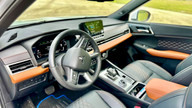

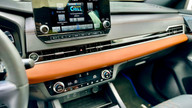



















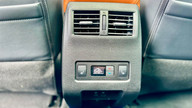



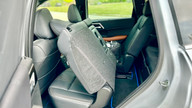

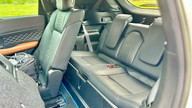

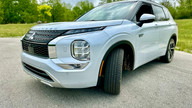









Comments